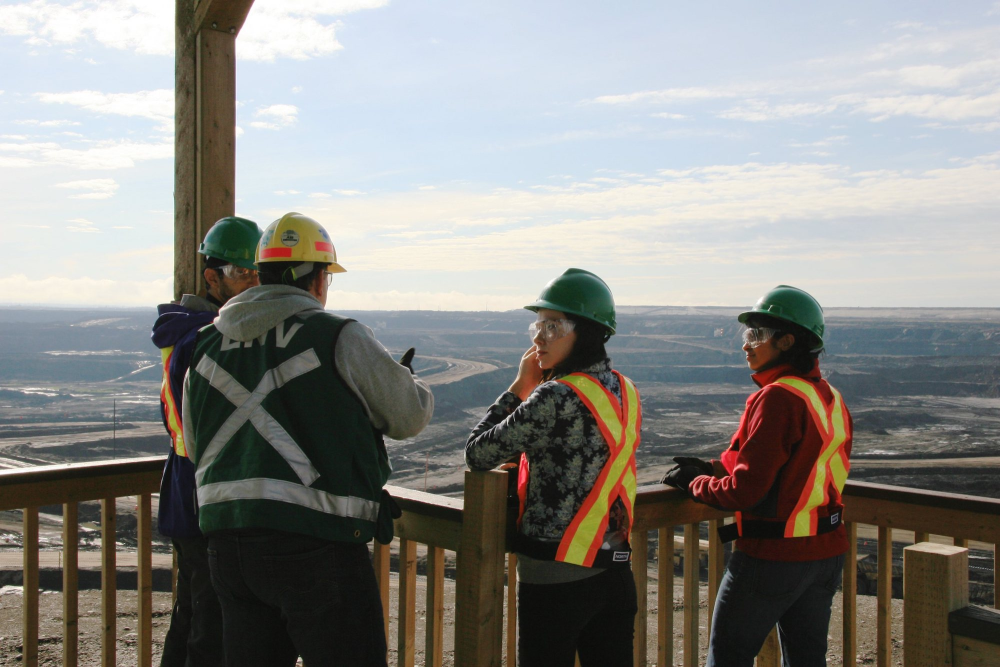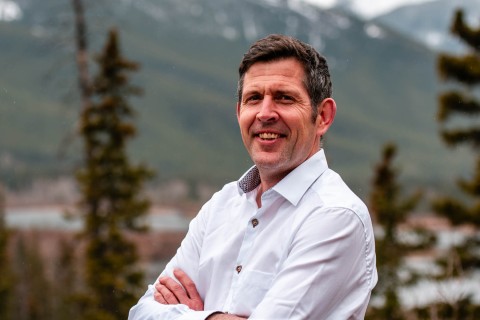Throughout the Pembina Institute’s 35-year history, we have been dogged in our efforts to stand up for Albertans. We have developed solutions to environmental problems and shared opportunities to help responsibly develop Alberta’s abundant oil and gas resources. It hasn’t been easy. It has elicited criticism — including a smear campaign and a targeted public inquiry that threatens to limit our ability to contribute to public policy discussions and decisions. And it’s only going to get harder.
As global market demand for oil shifts due to disruptive technologies and desire for lowest-carbon oil, and as oil sector employment fails to keep pace with increases in production due to increased automation, the road ahead for oil-producing provinces will be challenging. Coupled with the catastrophic consequences of climate change, which is already costing Canadians billions of dollars a year, the pressure on the fossil fuel sector to dramatically decarbonize and stop increasing Canada’s overall greenhouse gas emissions will only intensify.
Climate change is the most complex, most difficult problem facing world leaders today. More than ever we need to come together to figure out how to decarbonize and diversify our energy supply in such a way that our communities have energy security and our energy industry provides long-term, profitable careers in sustainable energy for generations to come. We can’t keep clinging to the 20th-century economy. We need to modernize and diversify, for Albertans’ economic future, Canadian unity and the very real danger of climate change. So why aren’t we all working together to solve this momentous problem? Why, instead, after decades of standing up for Albertans, are we having to defend ourselves against attacks from the Government of Alberta?
Pembina’s work
Founded in 1984 near Alberta’s Pembina River after a deadly sour gas blowout, our think tank of engineers and energy experts has a history of working with the oil and gas industry, communities and governments to protect Albertans from further harm. Together we tackled the environmental and climate consequences of uncontrolled fossil fuel development. In 2006, when former Alberta premier Peter Lougheed called for a hiatus on unfettered oilsands expansion until proper environmental rules were in place, we stepped up. We worked with industry and governments to figure out how to responsibly develop the oilsands for the betterment of Albertans, ecosystems and wildlife. Our sustained efforts to improve environmental accountability provided the foundation on which current industry executives, politicians and proud Albertans stand when they make claims about Alberta’s environmental policy and oilsands improvements.
We are proud of our work to reduce greenhouse gas emissions per barrel, our efforts to slow overall oilsands emissions (which are still growing) and to tackle the global problem of climate change in other areas of the Canadian economy as well. Over the years, as our organization grew, we made pivotal contributions to advancements in transit and transportation, climate policy like carbon pricing, buildings efficiency and renewable energy. We are proud of the leadership role we played in helping to build the consensus among industry and the environmental community that led to Alberta’s Climate Leadership Plan, and in informing the Pan-Canadian Framework on Clean Growth and Climate Change. Creating positive change is in our DNA.
And, of course, that takes funding.
The attack on Pembina’s funding
Being oil-centric, Alberta has long been subjected to the exciting highs and devastating lows of a boom and bust economy. In the latest downturn, the oil and gas industry has suffered deep drops in the price of crude and thousands of job losses. Industry and its supporters blamed those they felt stood in the way of pipeline development — not on forces changing the world of oil production and market demand — and on those who advocated for better climate and environmental policy. This polarizing narrative about “foreign” funding of environmentalists was first popularized in Alberta by far-right Rebel Media in 2012, and was picked up by Alberta’s United Conservative Party in the run up to the 2019 provincial election. An unprecedented smearing of Pembina became a central component of the UCP platform. Being an Alberta-based organization, with offices in both Calgary and Edmonton, the vitriol and threats were felt by Pembina employees in a way that is difficult for others to understand. Staff locked the door, which previously was always open to the public during business hours, and heightened their vigilance after a bucket of rusty nails was dumped in our parking lot. Being a non-partisan think tank and a federally registered charity, we respected the rules in place for charities set out by the Canada Revenue Agency and refused to engage in this political battle, instead letting the record of our good work as experts on oilsands environmental performance and other energy issues serve as a defence against the defamatory attacks.
But they didn’t stop after the election, despite our openness about our work and revenue sources, and our offer to meet with the Government of Alberta to talk about our work. Instead, the Government of Alberta announced the $30-million so-called War Room (now called the Canadian Energy Centre, devoted only to fossil fuels) and then launched a $2.5-million public inquiry. False claims asserted that Pembina received $8 million to fight pipelines despite the fact publicly available information shows the majority of that funding had nothing to do with pipelines or oilsands at all. Since 2006, Pembina has received on average about $400,000 a year from international sources to support our work providing the best factual information about the oilsands and to inform our work to recommend policy improvements. (For context, of 3,000-plus Canadian charities that received funding from outside Canada in 2016, a year for which comparative analysis is publicly available, with the top 105 receiving over $2 million.)
Let’s be crystal clear about this: As a Canadian organization, the vast majority of Pembina's funding is Canadian, but we do seek resources from funders who value the evidence-based and solutions-oriented approach that Pembina brings to the global problem of climate change. We did seek funding from Canadian and American funders to support our work, our efforts, our goal of improving oilsands development. Our goals didn’t change based on the source of funding; the organizations and partners who funded our efforts (international or otherwise) believed in our solutions-approach to these incredibly big and complex problems. The global nature of environmental challenges calls for an all-hands-on-deck approach to finding solutions. We have sought and will continue to seek funding from Canadian, American and international funders to support our work. In fact, the more we work together, the more we’re likely to solve this complex, global problem.
The importance of our work to find solutions for the industry’s greenhouse gas emissions and other environmental impacts wasn’t lost on the oil and gas industry itself. For a point of comparison, during the period 2006–2018, Pembina received about $5.5 million directly from work with oil and gas companies for projects to create life-cycle value assessments, advance technology solutions, bring leading environmental and industry thinkers together in forums, and to jointly advocate for policy improvements.
In 2006, we mapped out the path to carbon-neutral oilsands by 2020. We worked with leading oilsands companies to advance agreed-on recommendations on the need to price carbon to improve oilsands climate performance. And we pioneered environmental, social and governance (ESG) indicators for the oilsands through company-specific report cards on environmental performance. We can’t understate the importance of these indicators today: Increasingly, international energy investment depends on having good environmental credit, and it’s these indicators investors are looking at. Are we anti-pipeline, or anti-development? We are not for or against any particular project, per se. We have consistently advocated that decisions be consistent with Canada’s and Alberta’s stated commitment to reduce emissions and protect the environment, and whenever possible, we worked with stakeholders to resolve problems so development could proceed. We did, and will continue to, raise concerns about the environmental and climate impacts of development when they pose significant harm to Albertans, Canadians and ecosystems either cumulatively or alone.
Local economy, global climate change problem
You can find out more about our work here, and of course the full body of our work is publicly available in our publications and media summaries on our website for all to see. We stand by our work to reduce greenhouse gas emissions and improve environmental outcomes. People all around the world — including leaders of finance, industry, business and government; students, parents, grandparents; the most impoverished to the wealthiest among us — are coming together to reduce greenhouse gas emissions in their own countries. We were right then, and are now, to seek funding to support our work to reduce greenhouse gas emissions. And we hope you’ll help us as we continue this globally important work while fighting off this politically motivated attack.
A polarizing diversion
This inquiry and campaign is about going after our funding, silencing our voice and limiting our ability to partner with the many other pragmatic Albertans who want a role for Alberta in a 21st-century decarbonized economy. Defunding and isolating environmental voices makes it easier to backslide on climate policy and oppose federal climate action while clearing the path for fossil fuel development with less climate accountability, without doing the hard work of planning for a profitable, diversified, sustainable future for Albertans. By characterizing those who speak out for responsible development and action on climate change as “anti-Albertan” (and anti-Canadian), potentially productive conversation is polarized just when we urgently need to work together to solve this incredibly complicated problem. The inquiry and war room are a public relations battle to limit legitimate, factual criticism of Alberta’s environmental and climate performance. It’s a dangerous move that threatens to isolate Alberta from the mainstream global view on the need to fight climate change and modernize our economy.
Attack on fundamental freedoms
Freedom of expression, a Charter-protected right, ensures participation in the political process is open to all. And it permits the best policies to be chosen from an array of options. Astute commentators, including Amnesty International, have drawn parallels between the inquiry and attempts to stifle freedom of expression in authoritarian regimes around the world. It is shocking to most observers that here in Canada the considerably powerful arm of the state is being wielded to silence organizations like Pembina that work to lower greenhouse gas emissions and improve other environmental outcomes.
A legacy of protection
Since our founding after that fatal blowout, Pembina has been standing up for the short- and long-term interests of Albertans. We have worked tirelessly to ensure development in Alberta has been in the public interest, to protect people and conserve ecosystems. And in recent years, to tackle the global problem of climate change that’s already exacting punishing costs on Canadians, we expanded our focus to include greenhouse gas emissions to keep development in line with Canada’s international objective to limit warming to 1.5 degrees Celsius. Now is not the time to double down on the old 20th-century fossil-fuel economy and way of thinking. The climate imperative and the need to carefully map out a sustainable economic future for Alberta in a decarbonized world is too urgent and too complex for polarizing us-versus-them politics. We urgently need to work together to prepare Canada for the 21st-century, decarbonized economy. We hope you’ll join us.







